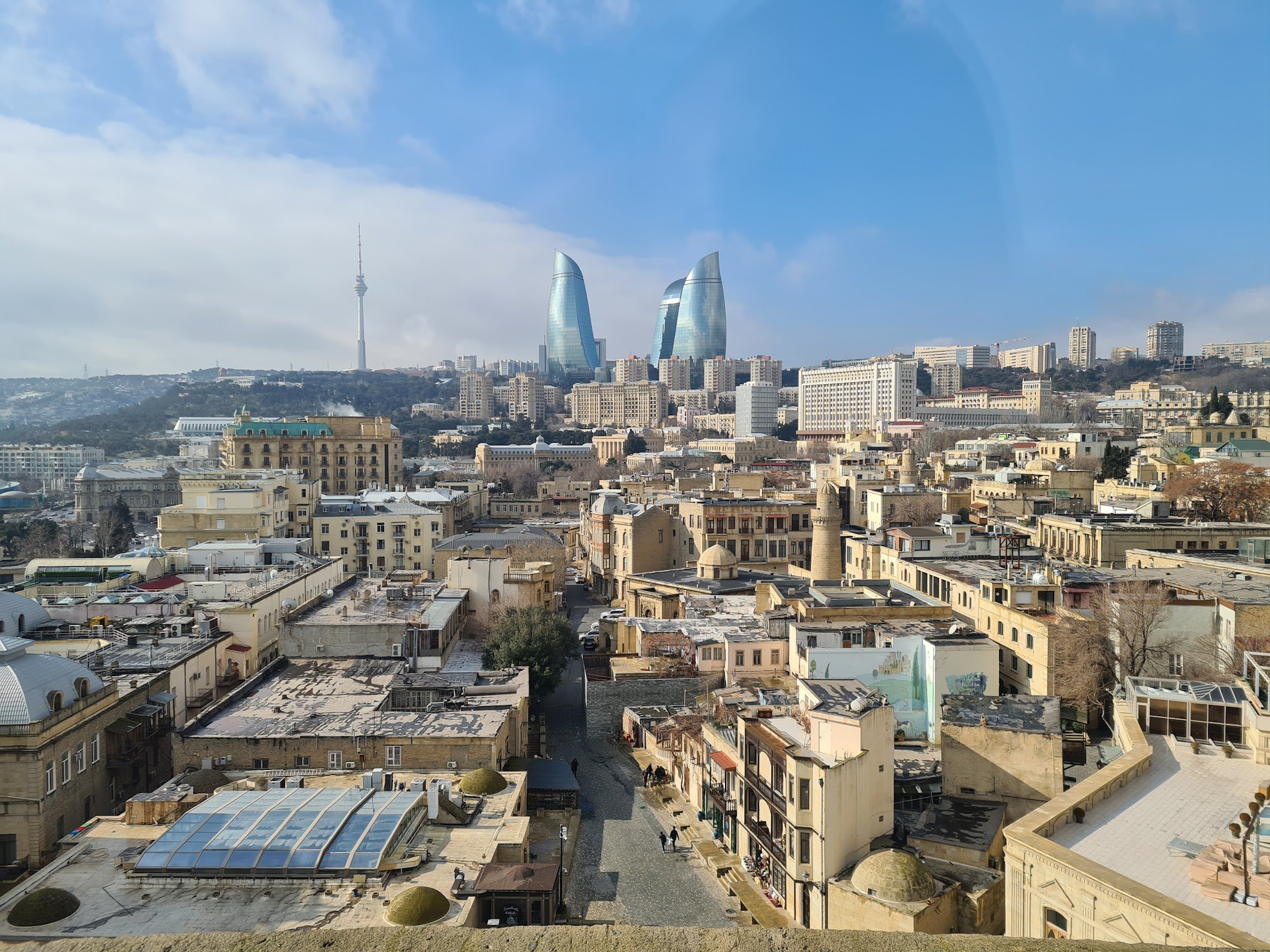Baku or Bust
I can’t think of how many times I’ve put off an experience, a trip, or a call to someone. But the fact of the matter is that our days aren’t promised to us. By no means, am I here to wax poetic about #yolo but I do think moving abroad is part of our seizing a moment (not the moment, just a moment). Time and again, I am grateful for the opportunity to hop on a plane and head somewhere I’ve only seen in a National Geographic magazine.
Nate wrote a beautiful piece in his recent newsletter (btw, you should subscribe as he writes every single week), about our weekend trip to Baku, the capital of Azerbaijan.
I’m toying with a few different takeaways from our trip but haven’t found the time to sit down and flush them out just yet. With that said, a few things–in no particular order and yes, in somewhat contradictory fashion– I’m mulling over.
The vastness and diversity of the countries that exist on this planet are mind boggling.
Race, culture, language and all the beautiful things that make us uniquely diverse are also the things we can use to alienate and isolate ourselves from others.
We rely too much on socially constructed identities as if they are fixed and others are fixed to these categories, assigned to boxes they cannot get out of.
We can have a sense of pride in our people, history, and society without putting down others
Borders and boundaries are social constructs that in effort to define a people and place, bulldoze and silence communities.
Travel, particularly on an American passport, is one of the great privileges that exists in the world.
We need to step outside of our comfort zones or explore less popular destinations to open our eyes to other ways of thinking and being.
International conflicts and century-old beefs cannot be remedied in a few conversations over drinks or at a conference table.
Governments can act in benevolent ways that are truly good for their people.
Unconscious biases develop from hearing single stories and limited perspectives.
Whomever catches our ear first will shape the narrative (and the way we experience truth).
Without further adieu, to Nate’s post.
Three Nights In The Land Of Fire - A Travelogue
February 19, 2023
February in Abu Dhabi means temps in the 80s, but February in the land of fire means winds strong enough to knock you off balance and evening lows below freezing. Walking across an open area, like a plaza or square, elicited several “okay, we can do this” intra-group pep talks as we traversed old town. This is my second recent trip into “real winter.” The trip to the Hague was a good dress rehearsal because those Azeri gusts don't play.
This plaza features wonderful dining and is an absolute wind-tunnel after dark
The Skinny on Azerbaijan - With a population of four million people, Baku, the capital, is as beautiful as any city I've visited. Its legacy as a major stop on the Silk Road gives it a deeply historical feel, like Xi'an or Istanbul. Two vestiges of the Silk Road come together in Azerbaijan: the trade routes brought Islam further to the east and brought dumplings from China westward into Slavic and Turkic cuisine.
The country is 96% Muslim but due to the imposed atheism of the Soviet era, the government and broad culture are secular. All the mosques we saw in the city were built in the classical style, but we learned they were of recent vintage, mostly built after the collapse of the USSR. Like we saw in Georgia, the architecture fell into three main buckets: ancient AF (classical), Soviet AF (brutalist), or futuristic AF.
Azerbaijan was on the business end of several historical conquests, having previously been a part of the Persian Empire, Russian Empire, and Soviet Union. The people are Turkic, like the people of Central Asia, Turkey, and the Uighers in China’s Xinjiang Province. But I noted they don't make the Turkic/Turkish distinction we make in English—our guides repeatedly called their countrymen "Turkish people." To that end, the Turkish flag is often displayed alongside the Azeri flag in the country. I've read elsewhere that Azerbaijan is culturally and politically Turkey's little brother. That largely checked out but leaves out the Soviet/Russian Empire thing.
Speaking of Russia, their relationship with Azerbaijan is complex. Azeris share a border with their colonizers. Students in primary school are taught the language and Russian is widely spoken by Azeris in the streets. Russian tourists fill the historical sites. But Azeris are apprehensive about their relationship with their northern neighbors. I heard the phrase “we have to keep Russia happy” no fewer than six times when discussing events in the Caucasus Region.
The Heydar Aliyev Center, the Presidential Museum, and center for explaining the Azeri side of their conflict with Armenia
Generally, I was struck talking to Azeris by their sense of pride in their country, their Islamic faith, and the ways in which the government provides for the people (from their oil & gas profits). Azerbaijan is a post-communist state but dodged the neoliberal shock doctrine and IMF structural adjustment bullet, that stripped many states of generous public benefits over the last thirty years. Put differently, the legacy of communism there is a fairly generous social welfare system, rather than a stripped down neoliberal shell of a state. They provide well for their people, especially for a country with a per capita GDP that ranks between Barbados and Albania:
Azeri workers get roughly a month of paid time off each year
Public university tuition is free for students who are academy qualified based on national exams
Tuition is also free (public or private) for people seeking employment in essential careers: doctors, pilots, etc.
They enjoy more or less zero out of pocket health care for basic and preventative care services
Typical rents run between $200 to $300/per month in the city
The government pays a subsidy to new parents, a one time baby bonus
They pay roughly $30 per month for utilities and the country subsidizes energy bills in the winter for all citizens
That’s quite a list.
Places that have less than the US seem to offer their citizens more but we somehow call them developing states.
Our Departure and a New Chapter
Republished from “A Teacher’s Evolving Mind” posted April 9, 2019
I was twenty-seven when I started teaching. George W. Bush was the President, I had hair, and the Mariners playoff drought was only five years-long. I've been doing this long enough that when I started I had an overhead projector with a jar full of Vis-a-Vis markers in my classroom.
Teaching is my profession and I love its moments: first days, conferences, graduation, the staff meet-up after Homecoming. When I got into teaching, my goal was to have a positive impact on my community. To help create better, smarter students as well as neighbors. This is the origin the “Nerd Farmer” moniker.
I'm a grump, but I'm an idealist. When I co-founded Teachers United in 2011, one of the criticisms of the organization was that we were a gaggle of newbie, idealistic, pie-in-the sky teachers. I remember one commenter on an early Seattle Times op-ed I penned saying, “let’s see what you think when you’ve been in a classroom for a while.” The implication was that we would lose our idealism and passion for equity and justice. Well, here we are, bub.
This is my thirteenth year in the classroom. I’m proud of my work as a teacher. I think I've made an impact on my students and the city. For the last several years people have constantly (and annoyingly) asked me “what’s next for you?” The implication was that I should run for office (hard nah), become a principal (nope, nein, never), or do policy advocacy full-time (not for me). I pride myself on not having to please voters, foundations, or funders. If I don't need your vote or grant money, I don't have to soft-pedal my truth to you. I’ve always loved teaching. I’ve never wanted to lead a school or push paperwork. I just want to teach and feel like I'm being successful and fully supported in doing it.
By my reckoning, I have taught well over fifteen-hundred students in Tacoma. I’ve started my teacher tree: Alex, Ty-isha, Janelle, and Corey with AJ and several others on the way. That's the work. The next generation is better than us. I see it everyday. I look forward to living in the world they and my students want to build. I think about this world often.
But it’s time for a change for me, a new chapter. I've shared my deep frustrations about the state of the teaching profession in the US elsewhere. I've worked at Lincoln for a decade. I love the school, the staff, and especially my students. But I realized at some point this year, that in order to stay in the classroom, I needed to do something different. One of the most consequential books I've ever read is called “Quitting America” by Randall Robinson. It's his story of leaving the US and relocating to Saint Kitts and Nevis. Frankly, given the state-of-affairs in the US, I'm not sure I want to break-up, but I do think I want to see other people for a while.
This summer Hope and I will move abroad. In August, we’ll be joining the staff of the American Community School, an international school in the Emirate of Abu Dhabi. I'll continue teaching AP American Government and ninth grade social studies. For years, we've taught students to be global citizens, now I'm going to be one. That's kinda dope. We’ve already researched and adopted a new soccer team, Al Wahda FC.
My new colleagues at ACS
Don't worry though, you’ll still hear from me. My Twitter Fingers ain't going nowhere, Nerd Farmer will continue (once we get settled), and I'll likely be writing more. You may see me again when President-Elect Inslee is putting together his Cabinet in 2021 (mostly kidding) or if the Seattle Sounders open a residency academy (deadly serious).
But for now, for me, it's time for a new challenge.
Excelsior.















